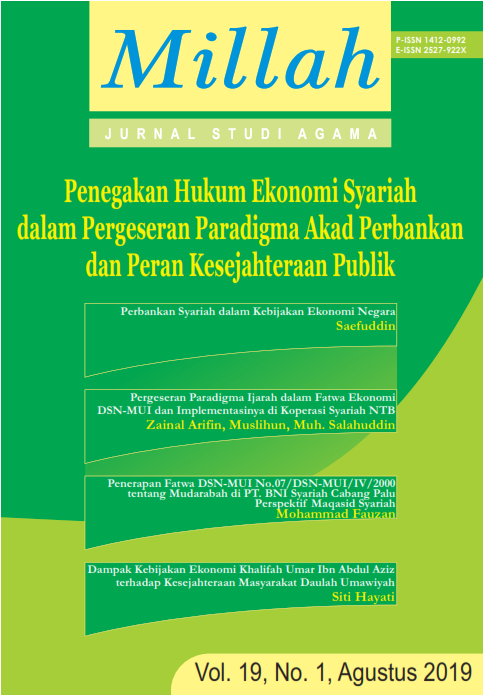Main Article Content
Abstract
Basic needs of people for clean water and a healthy environment are very fundamental. In reality there are still many remote areas suffering from the clean water crisis. In response, the Indonesian Ulama Council has issued a fatwa regarding the utilization of zakat, infaq, alms and endowments for the construction of clean water facilities as a form of implementation of sharia maqashid. One of the philanthropic institutions that also has a purpose for the social benefit is the institution of the Qur'an Waqf Agency. Through the Water Action for People program, the Alquran Waqf Agency has allocated the endowments for clean water facilities to help the areas experiencing clean water drought. This study aimed to observe the utilization of waqf funds in the Water Action for People program implemented by the Yogyakarta Alquran Waqf Agency as well as the perspective of Sharia Maqasid for these practices. This study used qualitative methods with normative and sociological approaches. The technique to determine the informants used referred to the "purposive sampling" technique. Data collection techniques used in this research included observation, interviews and documentation. The data analysis was conducted by means of Data Collection, Data Condensation, Data Display, and Conclusion. The results of this research showed that the utilization of water action for people has been in line with the utilization concepts as developed by the Directorate of Waqf Utilization for example in the aspects of benefit permanence, accountability, professional management and justice. In terms of the Sharia Maqasid the water action for people program had a very positive impact on beneficiaries, such as in keeping hifzhun din, hifzhunafs, hifzhu al-akl, hifzhu al-nasab, and hifzhu al-mal.
Keywords: Al quran Waqf Agency, Utilization, Cash Waqf, Maqasid Syariah.
Article Details
Copyright (c) 2019 Darnis Darnis, Rahmani Timorita Yulianti

This work is licensed under a Creative Commons Attribution-ShareAlike 4.0 International License.
Authors retain copyright and grant the journal right of first publication with the work simultaneously licensed under a Creative Commons Attribution (CC-BY-SA) 4.0 License that allows others to share the work with an acknowledgment of the work’s authorship and initial publication in this journal.
References
- Al-Syatibi, Abu Ishaq. al-Muwafaqat fi Ushuli al-Syariah, Beirut: Dar Al-Kotob Al-Ilmiyah, 2004.
- Armansyah Walian, Konsep Islam tentang kerja rekontruksi terhadap pemahaman kerja seorang Muslim, AN NISA'A, VOL. 8, NO. 1, JUNI 2013,
- Chulsum Umi dan Novia Windy, Kamus Besar Bahasa Indonesia, (Surabaya: Khasiko, 2006)
- Direktorat Pemberdayaan Wakaf Direktorat Jenderal Bimbingan Masyarakat Islam, Paradigma Baru Wakaf di Indonesia, (Jakarta : Depag RI 2008)
- Direktorat Pemberdayaan Wakaf Direktorat Jenderal Bimbingan Masyarakat Islam, "Pedoman Pengelolaan Wakaf Tunai",( Depag RI Jakarta 2008),
- Fahmi Medias, Rekontruksi Manajemen Dana Wakaf pada Lembaga Wakaf Indonesia, CAKRAWALA Vol 9, No. 2, 2014.
- Hamdanah, Motivasi Ibu-Ibu Mengikuti Pengajian di Badan Kontak Majelis Taklim (BKMT) Kota Palangka Raya, JURNAL TRANSFORMATIF (Islamic Studies) Volume 1, Nomor 2, 2017. https://doi.org/10.23971/tf.v1i2.794
- Ismardi Ilyas, Sertifikasi Maqashid al-Syari'ah terhadap Kemaslahatan dan Penerapannya, Hukum Islam, Vol. XIV No. 1 Juni 2014.,
- Muntaqo Firman, "Problematika dan Prospek Wakaf Produktif di Indonesia" Jurnal Al-Ahkam, Vol 25, No, 1, 2015, https://doi.org/10.21580/ahkam.2015.1.25.195
- Nasution Mustafa Edwin, Wakaf Tunai Sebuah Inovasi Finansial Islam Peluang dan Tantangan dalam Mewujudkan Kesejahteraan Umat, Jakarta: Program Studi Timur Tengah dan Islam Universitas Indonesia, 2006.,
- Newsletter Badan Wakaf Alquran, Amazing Wakaf (Edisi Juni-Juli 2014), hlm, 32
- Prabowo Hayu, dkk. Pendayagunaan Zakat, Infaq, Shadaqah dan Wakaf untuk Pembangunan Sarana Air dan Sanitasi, Jakarta: MUI 2016.,
- Pusat Pembinaan dan Pengembangan Bahasa, Kamus Besar Bahasa Insonesia, (Jakarta: Balai Pustaka, 1991), Sa'adah Nailis dan Wahyudi Fariq, Manajemen Wakaf Produktif: Studi
- Analisis pada Baitul Mal Di Kabupaten Kudus, EQUILIBRIUM: Jurnal Ekonomi Syariah Volume 4, Nomor 2, 2016.
- Susanto, Heru, "Eksistensi dan Peran Ekonomis Harta Wakaf" Jurnal Studia Islamika Vol. 13, No. 2 Desember 2016, https://doi.org/10.24239/jsi.v13i2.442.316-342
- Tim Penerjemah Al-Quran UII, Al-Qur'an dan Tafsir, (Yogyakarta: UII press, 1999),
- Umar Husein "Metode Penelitian Skripsi dan Tesis" Ed. II (Jakarta : Rajawali Pers 2011),
- https://jdih.kemenkeu.go.id/fulltext/2004/41TAHUN2004UU.htm
- https://www.republika.co.id/berita/dunia-islam/wakaf/18/10/16/pgovmd384-potensi-wakaf-tunai-capai-rp-180-triliun
- https://www.wakafquran.org/
- http://www2.kkp.go.id/
References
Al-Syatibi, Abu Ishaq. al-Muwafaqat fi Ushuli al-Syariah, Beirut: Dar Al-Kotob Al-Ilmiyah, 2004.
Armansyah Walian, Konsep Islam tentang kerja rekontruksi terhadap pemahaman kerja seorang Muslim, AN NISA'A, VOL. 8, NO. 1, JUNI 2013,
Chulsum Umi dan Novia Windy, Kamus Besar Bahasa Indonesia, (Surabaya: Khasiko, 2006)
Direktorat Pemberdayaan Wakaf Direktorat Jenderal Bimbingan Masyarakat Islam, Paradigma Baru Wakaf di Indonesia, (Jakarta : Depag RI 2008)
Direktorat Pemberdayaan Wakaf Direktorat Jenderal Bimbingan Masyarakat Islam, "Pedoman Pengelolaan Wakaf Tunai",( Depag RI Jakarta 2008),
Fahmi Medias, Rekontruksi Manajemen Dana Wakaf pada Lembaga Wakaf Indonesia, CAKRAWALA Vol 9, No. 2, 2014.
Hamdanah, Motivasi Ibu-Ibu Mengikuti Pengajian di Badan Kontak Majelis Taklim (BKMT) Kota Palangka Raya, JURNAL TRANSFORMATIF (Islamic Studies) Volume 1, Nomor 2, 2017. https://doi.org/10.23971/tf.v1i2.794
Ismardi Ilyas, Sertifikasi Maqashid al-Syari'ah terhadap Kemaslahatan dan Penerapannya, Hukum Islam, Vol. XIV No. 1 Juni 2014.,
Muntaqo Firman, "Problematika dan Prospek Wakaf Produktif di Indonesia" Jurnal Al-Ahkam, Vol 25, No, 1, 2015, https://doi.org/10.21580/ahkam.2015.1.25.195
Nasution Mustafa Edwin, Wakaf Tunai Sebuah Inovasi Finansial Islam Peluang dan Tantangan dalam Mewujudkan Kesejahteraan Umat, Jakarta: Program Studi Timur Tengah dan Islam Universitas Indonesia, 2006.,
Newsletter Badan Wakaf Alquran, Amazing Wakaf (Edisi Juni-Juli 2014), hlm, 32
Prabowo Hayu, dkk. Pendayagunaan Zakat, Infaq, Shadaqah dan Wakaf untuk Pembangunan Sarana Air dan Sanitasi, Jakarta: MUI 2016.,
Pusat Pembinaan dan Pengembangan Bahasa, Kamus Besar Bahasa Insonesia, (Jakarta: Balai Pustaka, 1991), Sa'adah Nailis dan Wahyudi Fariq, Manajemen Wakaf Produktif: Studi
Analisis pada Baitul Mal Di Kabupaten Kudus, EQUILIBRIUM: Jurnal Ekonomi Syariah Volume 4, Nomor 2, 2016.
Susanto, Heru, "Eksistensi dan Peran Ekonomis Harta Wakaf" Jurnal Studia Islamika Vol. 13, No. 2 Desember 2016, https://doi.org/10.24239/jsi.v13i2.442.316-342
Tim Penerjemah Al-Quran UII, Al-Qur'an dan Tafsir, (Yogyakarta: UII press, 1999),
Umar Husein "Metode Penelitian Skripsi dan Tesis" Ed. II (Jakarta : Rajawali Pers 2011),





